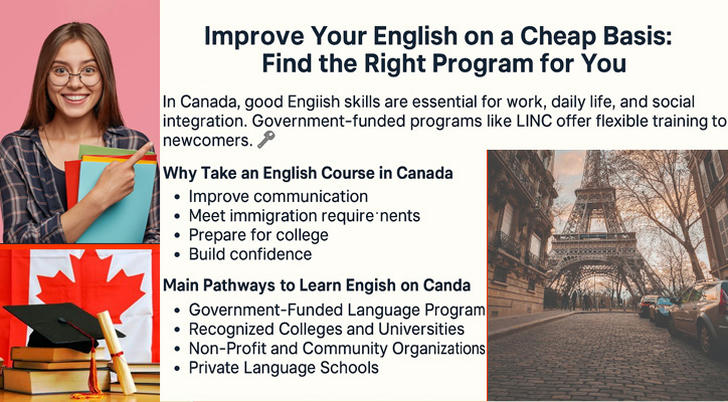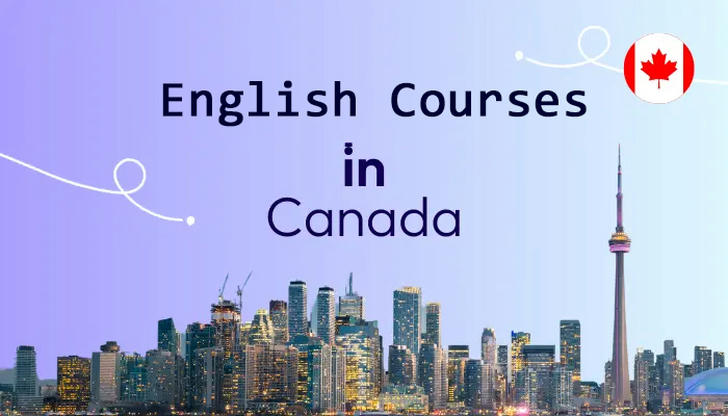📘 Improve Your English on a Cheap Basis: Find the Right Program for You
In Canada, good English skills are essential for work, daily life and social integration. Government-funded programs like LINC provide newcomers with flexible language training — online or in-person — designed to improve communication skills and meet language requirements for immigration or citizenship, with minimal course requirements and no degree or experience required.

💡 Why Take an English Course in Canada?
- Improve communication in daily life and workplaces
- Meet language requirements for immigration or citizenship
- Prepare for college or university
- Build confidence and social connections
🛠️ Main Pathways to Learn English in Canada
- Government-Funded Language Programs
- Recognized Colleges and Universities
- Non-Profit and Community Organizations
- Private Language Schools
💰 How to reduce study costs by taking advantage of government-funded courses?
Through government or non-profit organizations
1. LINC (Language Instruction for Newcomers to Canada)
- Eligibility: Permanent residents, protected persons, resettled refugees
- Formats: Full-time or part-time, day/evening/weekend, in-person or online
- Benefits:
- No entrance exam required
- Transportation and child care support
- Certificate upon CLB completion (CLB 4+ meets citizenship language requirement)
2. TIES – The Immigrant Education Society (Alberta)
- CLB Levels: Pre-CLB to CLB 6
- Teaching Method: In-person, online, or blended
- Funded by: Service Canada
- Additional Support: Free child care during classes
- Focus: Real-world English skills for daily and workplace communication
🎓 Through Canada's renowned universities and institutions
1. George Brown College (Ontario)
- Program Options:
- Full-time ESL for academic or career goals
- Part-time courses for flexible learning
- Occupational Language Training:
- Industry-specific programs (healthcare, customer service, etc.)
- Funded by the Ontario Government
- Accessibility: Many programs require no placement test
2. Douglas College (British Columbia)
- Program: Academic College English (ACE)
- Structure:
- 3 levels, each with 4 courses: Writing, Grammar, Listening/Speaking, Reading
- 20 hours/week including labs and workshops
- Outcomes:
- Certificate after Level 3
- Option to earn university prep credits while studying
📊 Comparison: Government Programs vs. College Programs
| Criteria | Government-Funded (LINC, TIES) | College Programs (George Brown, Douglas) |
|---|---|---|
| Target Group | Newcomers, refugees, permanent residents | Academic-bound learners, professionals |
| Learning Format | Flexible, online/in-person, support services | Full-time structured, credit-based |
| Funding Support | Funded by federal or provincial governments | Some funded by provincial government |
| Focus Areas | Life skills, employment, citizenship requirements | Academic English, university preparation |
| Certificate | CLB certificate (meets citizenship requirement) | Academic English certificate with course credits |
🚀 Career Benefits of Learning English in Canada
- Increased chances of finding a stable job
- Better communication in professional settings
- Eligibility for advanced training and certifications
- Stronger integration into Canadian society
📝 How to Apply for English Courses in Canada
1️⃣ Government Programs (LINC)
- Check if you're eligible: Permanent resident, refugee, or protected person
- Book a CLB test at a local language assessment center
- Get referred to a nearby LINC school
- Register and choose a suitable schedule (online or in-person)
2️⃣ Public Colleges & Universities
- Visit the college website (e.g. George Brown, Douglas College)
- Apply online through the school or application portal
- Take a placement test if needed
- Wait for admission, then choose your courses
- Some programs are government-supported
3️⃣ Non-Profit or Community Organizations (TIES)
- Find a local ESL provider (like TIES or ISSofBC)
- Contact them directly to register
- Take a CLB test if required
- Join classes (full-time, part-time, online or in-person)
- Programs are often low-cost or supported
4️⃣ Private Language Schools
- Choose a school (e.g. ILAC, ILSC)
- Apply on their website
- Take a placement test
- Pay tuition and start classes
- Flexible start dates, but not government-funded
❓ Frequently Asked Questions (FAQs)
- Can I join if I speak little or no English?
Yes. These English courses are for complete beginners (Pre-CLB level). - Is child care available during classes?
Many LINC programs offer childminding services during in-person classes. - Do I need to pay for these courses?
Government-funded programs have no additional fees for eligible participants. - Will I get a certificate?
Yes. Upon completing a CLB level or academic program, you will receive a certificate.
🔚 Conclusion
Learning English in Canada is more than language—it’s a pathway to opportunity, connection, and growth. Whether through government-funded programs or academic institutions, there’s a solution for every stage of your journey. Start today, and build a stronger future through language.

All information is collected from publicly available resources such as Apprenticeship.gov and local union training programs.
